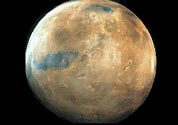Report says Mars dried out more than 3 billion years ago
Today's cold, dry climate on Mars evolved about 3.5 billion years ago at the end of a period when that planet had seen moist conditions, new research indicates.

An international team of scientists who developed a timeline for Mars' geological evolution reported in Friday's issue of the journal Science that the planet had three distinct eras.
If Mars had been hospitable to life, it would have been only in its early, wet years, according to the researchers, led by Jean-Pierre Bibring of France's Institute for Space Astrophysics (Institut d'Astrophysique Spatiale).
The planet formed about 4.6 billion years ago, and the first the formation of clay materials needed abundant water and moderate temperatures, the researchers said.
Then, starting about 4 billion years ago a second era began marked by volcanic activity that spewed sulfur into the environment and began a drying-out of the planet.
Between 3.2 billion years ago and 3.5 billion years ago the third era began, marked by minerals dominated by ferric oxides which have not been formed or altered by water, they concluded.
That increasingly dry and acidic environment was "not a pleasant place for any form of life, even a microbe," said John Mustard, a geologist at Brown University in Rhode Island, co-author of the paper.
The researchers from France, Italy, Russia, Germany and the United States developed their timetable by studying data from Mars Express, a mission launched by the European Space Agency, which carried an instrument capable of determining the mineral composition of the planet's surface. The research was funded by the space and research agencies in all five countries, reports AP.
O.Ch.
Subscribe to Pravda.Ru Telegram channel, Facebook, RSS!




